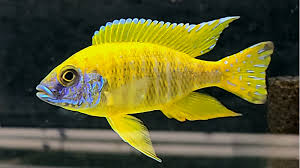1
/
of
1
Midwest Aquarium and Pond Supplier LLC
(119) Baenschi Cichlid 3in
(119) Baenschi Cichlid 3in
Regular price
$80.00 USD
Regular price
Sale price
$80.00 USD
Shipping calculated at checkout.
Quantity
Couldn't load pickup availability
The common name "Baenschi" can refer to two different species of cichlid with very different origins and care requirements: the African Yellow Regal Peacock (Aulonocara baenschi) and the South American Inca Dwarf Cichlid (Apistogramma baenschi). Knowing which one you have is crucial for providing the correct care.
African: Yellow Regal Peacock (Aulonocara baenschi)
The Yellow Regal Peacock is a vibrant and relatively peaceful African cichlid that lives in Lake Malawi.
Appearance
- Male: Features a bright yellow body with an iridescent blue face and fins.
- Female: Less colorful, with a mostly gray body.
Tank and water requirements
- Tank size: A minimum of 55 gallons is recommended for a group.
- Substrate: A sandy substrate is best, as they are bottom-sifters.
- Filtration: Robust filtration is necessary to handle their bioload and maintain water quality.
-
Water parameters:
- Temperature: Maintain 76–82°F (24–28°C).
- pH: A high pH of 7.8–8.6 is required to replicate their natural environment.
- Decorations: Provide plenty of rocks, caves, and crevices to create territories and hiding places.
Diet and feeding
- Carnivorous diet: In the wild, they feed on invertebrates in the sand.
- Food types: A high-quality carnivore pellet or flake should be the staple. Supplement with frozen foods like mysis shrimp, brine shrimp, and bloodworms.
Temperament and tank mates
- Semi-aggressive: While generally peaceful compared to other African cichlids, males can be territorial toward their own kind during breeding.
- Tank mates: They are best kept with other similarly-sized and peaceful African cichlids from Lake Malawi.
South American: Inca Dwarf Cichlid (Apistogramma baenschi)
The Inca Dwarf Cichlid is a smaller, peaceful South American cichlid that thrives in planted aquariums.
Appearance
- Male: Displays a brilliant yellow body with bold black markings and striking fin extensions.
- Female: Less colorful, but will develop a vibrant yellow and black pattern when breeding.
Tank and water requirements
- Tank size: A 20-gallon tank is the minimum for a pair, with a 30-gallon recommended for a community tank.
- Substrate: Fine, soft sand is crucial for their natural sifting behavior.
- Filtration: A gentle but consistent filtration system is best, as they prefer slow-moving water.
-
Water parameters:
- Temperature: Maintain 72–86°F (22–30°C).
- pH: A slightly acidic to neutral pH of 6.0–7.2 is ideal.
- Decorations: Provide plenty of hiding spots with driftwood, caves, leaf litter, and dense live plants.
Diet and feeding
- Carnivorous diet: These are micropredators and should be fed a high-protein diet.
- Food types: Offer high-quality pellets or flakes, supplemented with live or frozen foods like brine shrimp, daphnia, and bloodworms.
Temperament and tank mates
- Generally peaceful: They are typically peaceful but can become territorial during breeding. For a group, keep a single male with several females.
- Tank mates: Choose peaceful, non-aggressive species like tetras, corydoras catfish, or pencilfish
Share
No reviews

